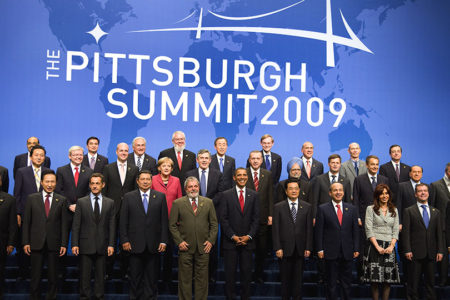The Emergent Kingdom
The emergent church considers itself a “conversation,” not a movement. As such, it is a loose coalition of Christian leaders welded together by a postmodern philosophy of ministry that rejects much of the theology evangelicals have held dear. There is little attempt to rally around doctrinal positions, which are often seen as out-of-date in a pluralistic world.
But if there is one issue around which emergent leaders are united, it is their idea of the Kingdom of God. Of course, Christians have always been vitally interested in God’s Kingdom. But the emergents’ particular understanding of it is actually preparing the church to be sucked away from biblical distinctives and into acceptance of principles that will be foundational to a system ruled ultimately by a godless global leader.
Emergent theology embraces three distinct understandings of the Kingdom that draw the movement toward acceptance of a one-world system. They involve (1) the time of the Kingdom, (2) the message, and (3) the citizens.
Kingdom Now
The emergent conversation has closed ranks around the belief that the Kingdom of God is on Earth now, even though it will progressively resemble its heavenly glory as its members understand and practice their true mission. And exactly what is that mission? To make the world a better place by aggressively challenging injustice; fighting poverty; aiding the sick; working on ecological concerns; and, in general, saving this planet and everything on it.
In the book An Emergent Manifesto of Hope, Sherry and Geoff Maddock wrote, “Our principle desire is to see God’s kingdom come on earth as it is in heaven. We believe this happens when God’s people are renewed around God’s mission of love and justice in the world.”1 The Maddocks get more specific: “Through practices such as caring for AIDS sufferers, feeding the homeless, protesting the wanton destruction of the environment, or welcoming newly arrived refugees, we find salvation that is closer to the shalom of Scripture.”2
A present-day kingdom wrapped around a purely social agenda rather than the gospel of Christ is music to the ears of unbelievers. Nothing here fundamentally separates the emergent church’s mission from that of secular government.
Kingdom Message
Emergent leaders do not envision Jesus coming to judge the wicked; nor do they accept the destruction and refashioning of the earth, as Jesus (Mt. 24—25) and the apostles Peter (2 Pet. 3) and John (Rev. 19—21) described. After all, many of them believe hell was invented by the Pharisees,3 redemption from sin is not the real need of humanity, and justification (as historically understood) is not taught in the epistles of Paul.4
Therefore, the mission of the followers of Christ is reduced to attending to social ills and needs so that humanity can live in peace and harmony. As Brian McLaren, the most prolific emergent writer, stated, “I hope that both they [his neighbors] and I will become better people, transformed by God’s Spirit, more pleasing to God, more of a blessing to the world so that God’s kingdom (which I seek, but cannot manipulate) comes on earth as in heaven.”5
In emergent theology, salvation has been shifted from the spiritual to the physical. Therefore, its message does not concern itself with redemption of mankind but, rather, the restoration of Earth. After all, the emergents will tell us, our real problem is not alienation from God because of sin, but the wrecking of the planet due to abuse and injustice. This shift in focus has come about due to a fundamental modification in theology in which emergent leaders resist original sin, reject substitutionary atonement, deny the existence of hell, refute inerrancy of Scripture, and cozy up to universalism.
Those schooled in the fine art of relativistic thinking and not well-versed in Scripture find the emergent message pleasing. In the name of Christ, we can march lockstep with unbelievers as we attempt to address the planet’s social injustices. What is missed is that Satan is more than willing to give ground to social agendas if we will but ignore mankind’s real problem: separation from God.
Kingdom Citizens
Emergent theology downplays the gospel when defined as the Good News of the offer of forgiveness of sin and the righteousness of God because of the work of Christ. Why? Because, according to most emergent leaders, most people are already in the Kingdom. McLaren laid out his cards when he wrote, “Maybe God’s plan is an opt-out plan, not an opt-in one. If you want to stay out of the party, you can….But it’s hard for me to imagine somebody being more stubbornly ornery than God is gracious.”6
One emergent leader, representative of many, goes so far as to distinguish the followers of Christ from Christianity: “The emerging church movement has come to believe that the ultimate context of the spiritual aspirations of a follower of Jesus Christ is not Christianity but rather the kingdom of God.”7
If most of humanity is already in the Kingdom, regardless of its relationship with Christ, exactly who are the citizens of the Kingdom of God? Apparently, anyone who does not choose to eliminate himself from it. This thinking, known as inclusivism, teaches that even Hindus, Muslims, and animists, while not followers of Christ, would nevertheless be in God’s Kingdom simply because they have not “opted out.”
The gospel of the emergent conversation expresses little interest in humanity’s true spiritual condition (its alienation from God due to sin) and has morphed into little more than social enhancement of the culture and physical improvement of the planet. This is a welcomed message to those wanting a better quality of life without having to bow before the Holy One.
If people could be assured that they are already accepted by God and that being kind to others not only will assure them a place in the Kingdom but also make this planet a virtual utopia, everyone is a winner. Right? Wrong.
This is the type of message Satan would love people living in the end-times to embrace, for it eliminates the barriers between the beliefs of God’s people and the hopes and dreams of most unbelievers. Those who claim the name of Christ and succumb to such a philosophy will find themselves loved and accepted by the world system. Those who cling to the truth of Scripture and refuse to dilute the pure gospel will find themselves progressively marginalized. But take comfort: It was Jesus who said, “Blessed are those who are persecuted for righteousness’ sake, for theirs is the kingdom of heaven” (Mt. 5:10).
ENDNOTES
- Sherry Maddock and Geoff Maddock, “An Ever-Renewed Adventure of Faith,” An Emergent Manifesto of Hope, Doug Pagitt and Tony Jones (Grand Rapids, MI: Baker Books, 2007), 80.
- Ibid., 82.
- Brian D. McLaren, The Last Word and the Word After That (San Francisco: Jossey-Bass, 2005).
- N.T. Wright, What Saint Paul Really Said (Grand Rapids, MI: Eerdmans, 1997).
- Brian McLaren, A Generous Orthodoxy (Grand Rapids, MI: Zondervan, 2004), 263.
- McLaren, The Last Word and the Word After That, 138.
- Samir Selmanovic, “The Sweet Problem of Inclusiveness,” An Emergent Manifesto of Hope, 192.







